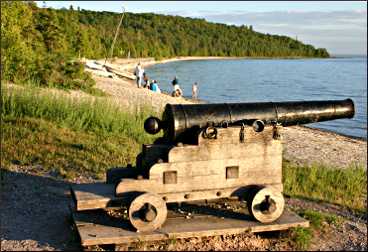The War of 1812
Yanks invaded Canada? Brits swarmed Wisconsin? It was the war no one remembers.

© Beth Gauper
For its bicentennial in 2012, we heard about the War of 1812.
Now what was that war about, anyway?
Most Americans know only that it produced "The Star Spangled Banner." But Americans were the aggressors, looting and burning York-today, Toronto-in 1813.
The British returned the favor in 1814, burning Washington, D.C., including the Capitol and White House.
As the center of the lucrative fur trade, the western Great Lakes region had a few dogs in the fight.
To observe the bicentennial, the Door County Maritime Museum in Sturgeon Bay opened the exhibit "The War of 1812 &mdas; Naval Battle for the Great Lakes."
Villa Louis in Prairie du Chien, Wis., reenacted the siege and capture of that fur-trade post by British troops and their Indian allies.
Fort Mackinac on Mackinac Island reenacted its capture that day by British forces, accompanied by the replica sloop Friends Good Will, a fur-trade ship seized by the British a few days after their victory and conscripted into the Royal Navy.
The home of the Friends Good Will, the Michigan Maritime Museum in South Haven, showed a War of 1812 bicentennial exhibit, "War on the Great Lakes!"
Fort William Historical Park in Thunder Bay tried to repel American invaders at the Battle for Fort William, an important fur-trade post.
The U.S. Navy, which found its sea legs during the war, sent six ships to the western Great Lakes for Navy Weeks in Milwaukee and Chicago.
And then it was over, until the next big anniversary.
For an entertaining take on the war from the Canadian viewpoint, read the Walrus magazine essay " That Time We Beat the Americans."
"To Canada's good fortune, the post-Revolution U.S. Army was stacked with bunglers and officers past their prime," the author writes. "It might have taken Canada easily, if not for the miraculously systemic idiocy among the top brass."
One of the bunglers was Brigadier Gen. Zebulon Pike, the explorer who negotiated, more or less, the treaty that gave the United States much of modern-day Minneapolis and St. Paul.
He died in 1813 in an explosion set by the British during the Battle of York.